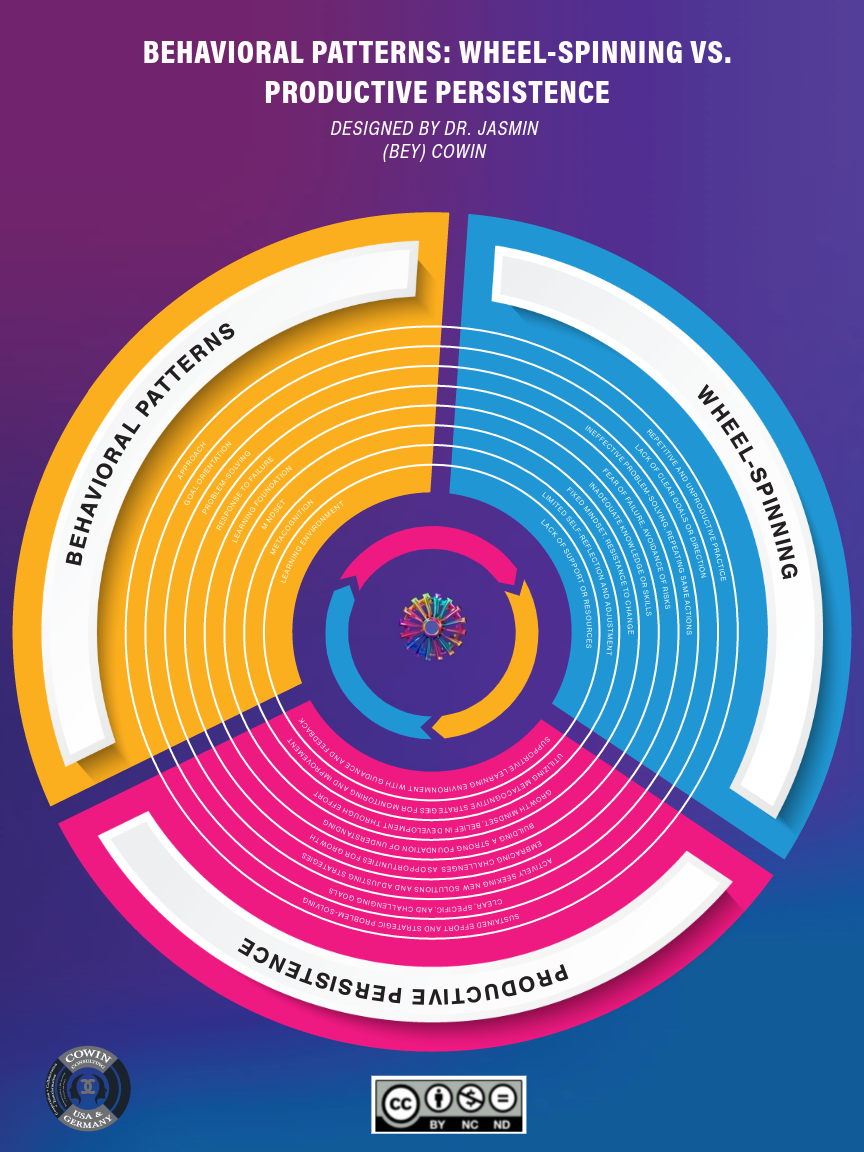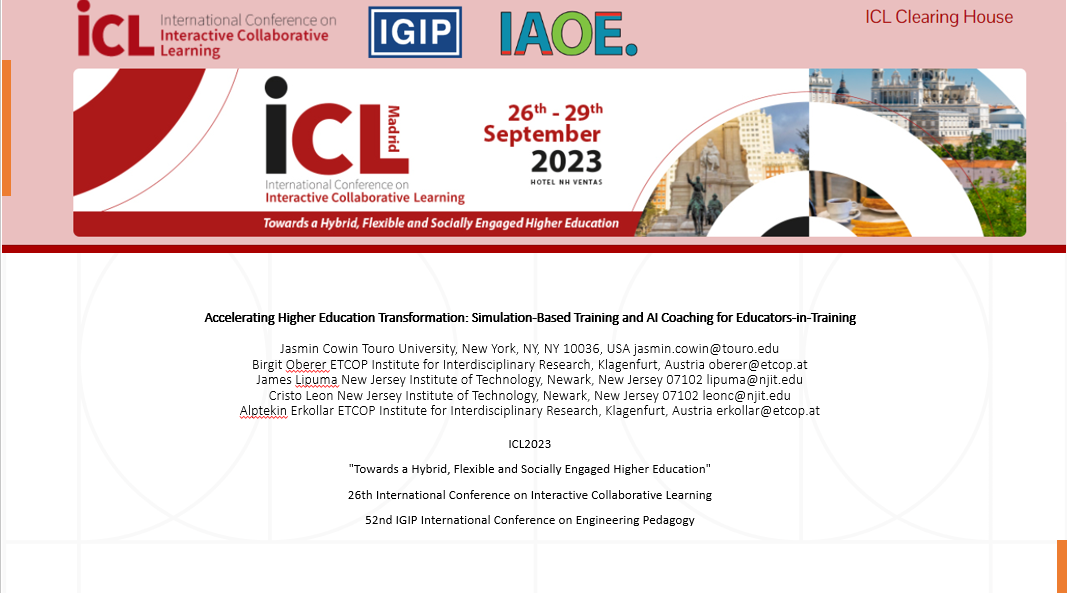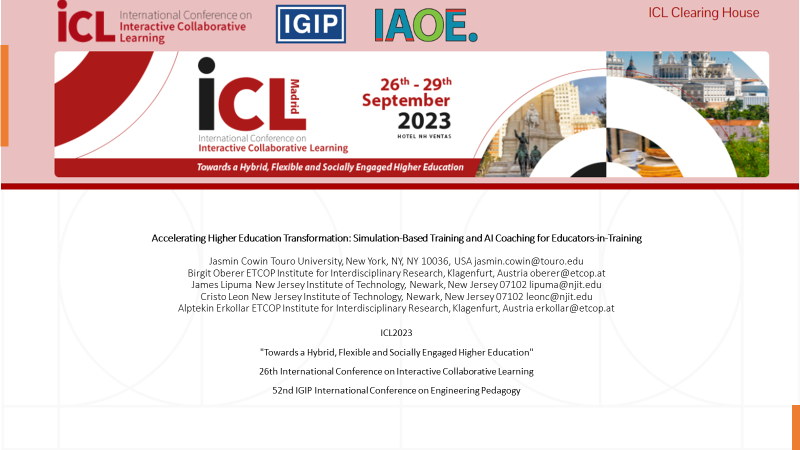I am delighted to announce the recent publication of our paper, titled “Accelerating Higher Education Transformation: Simulation-Based Training and AI Coaching for Educators-in-Training.” This paper has been featured in the conference proceedings titled “Towards a Hybrid, Flexible and Socially Engaged Higher Education,” published by Springer Nature, Switzerland.
Our transdisciplinary collaborative effort grew from the International Conference on Interactive Collaborative Learning (ICL 2023), Madrid, and signifies a significant step forward in our journey to reshape educational paradigms through the integration of cutting-edge technologies (Cowin et al., 2024).
Cowin, J., Oberer, B., Lipuma, J., Leon, C., & Erkollar, A. (2024). Accelerating Higher Education Transformation: Simulation-Based Training and AI Coaching for Educators-in-Training [ICL]. In M. E. Auer, U. R. Cukierman, E. Vendrell Vidal, & E. Tovar Caro (Eds.), Towards a Hybrid, Flexible and Socially Engaged Higher Education (CLDM_Dv; Vol. 899, pp. 532–541). Springer Nature Switzerland; /Research/Education. https://doi.org/10.1007/978-3-031-51979-6_55
Conference Presentation
Cowin, J., Oberer, B., Lipuma, J., Leon, C., & Erkollar, A. (2023, September 26). Accelerating Higher Education Transformation: Simulation-Based Training and AI Coaching for Educators-in-Training [Presentation] [Conference]. International Conference on Interactive Collaborative Learning (ICL 2023), Madrid, Spain. http://icl-conference.org/icl2023/
Paper Abstract
As the world undergoes remarkable transformations powered by Artificial Intelligence, the challenge arises for educational systems and institutions to adapt. How can we adequately equip educators-in-training to flourish in unprecedented change? The emergence of flexible, hybrid, and socially engaged learning environments has created a need for effective training methodologies that empower educators-in-training to thrive in this new paradigm. Higher education institutions need to expand aspiring educators’ human and professional potential amidst accelerating change, in line with the clarion call of the Sustainable Development Goal 4 Quality Education “By 2030, substantially increase the supply of qualified teachers, including through international cooperation for teacher training in developing countries, especially least developed countries and small island developing States” [1]. Simulation-based training coupled with Artificial Intelligence offers a solution to equip educators with the necessary skills and competencies to navigate complex real-world educational settings to succeed in classrooms of the 21st century. Simulation-based training allows educators-in-training to develop their skills and build confidence in their abilities to effectively engage with students in multifaceted classroom environments by providing a safe and controlled space for experimentation and practice. In conclusion, this paper and presentation explore the shifting teaching paradigms in higher education using simSchool and Mursion simulation platforms as examples and examine inclusive and dynamic practices that promote sustainable systems change in line with SDG 4. Quality Education, supporting educators-in-training by identifying strengths and encouraging personal and professional growth through AI feedback loops and faculty coaching.
Keywords: Artificial Intelligence, Educators-in-training, Simulation-based training, Sustainable systems change
Acknowledgments
I extend my heartfelt gratitude to my colleagues and peers and the supportive community that made this research possible. Our collaborative efforts reflect a unified vision for the future of education, one that embraces the challenges and opportunities presented by the digital age.
Disclosure statement
No conflict of interest pertains to the research presented above.
ORCID
Jasmin Cowin http://orcid.org/0000-0002-0405-8774
Birgit Oberer http://orcid.org/0000-0001-7231-7902
Alptekin Erkollar http://orcid.org/0000-0003-3670-5283
James Lipuma https://orcid.org/0000-0002-9778-3843
Cristo Leon https://orcid.org/0000-0002-0930-0179



